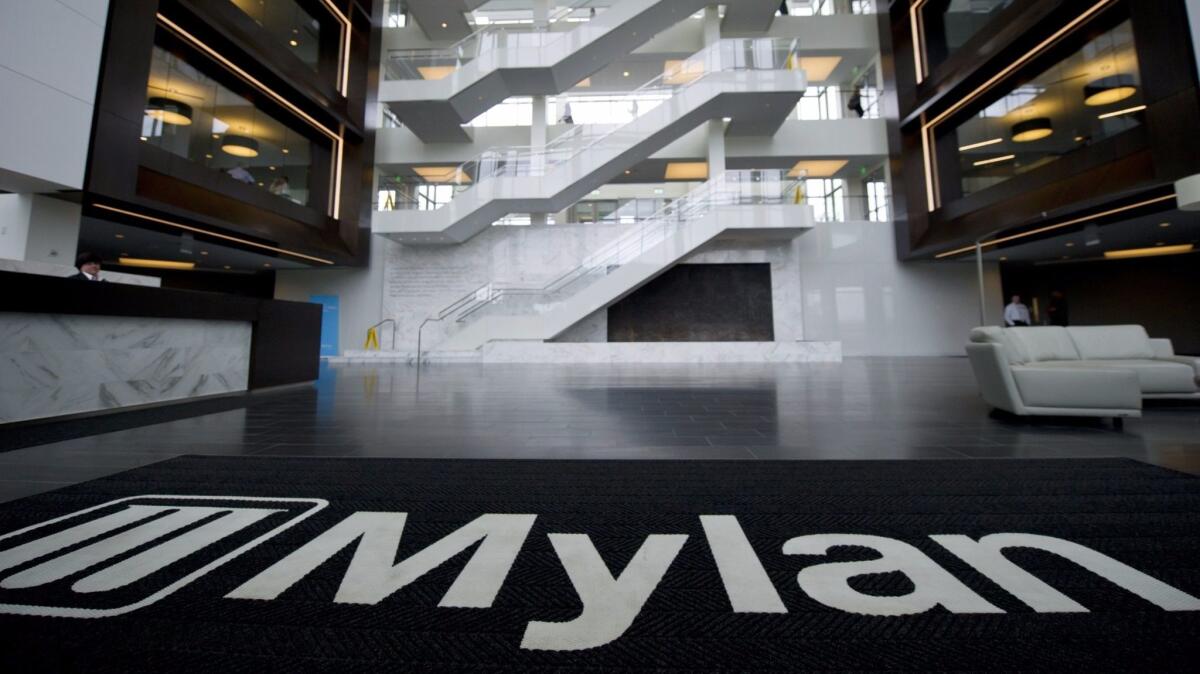Column: A price-fixing noose tightens around Mylan, the company that profiteered from the Epipen

Things are getting tough for Mylan, the generic drug maker that long has been one of our less creditable corporations.
Since December, the company has been in the crosshairs of more than 40 states investigating price-fixing in the generics industry. On Tuesday, they turned up the heat, with a motion to bring civil charges against Mylan’s second-in-command, President and Executive Director Rajiv Malik. Investors got the message instantly, with the stock taking a hit of nearly 7%, falling $2.53 to $35.71 in Tuesday’s Nasdaq trading.
Mylan was one of six generics companies originally sued by the coalition of states led by Connecticut for fixing the prices of two drugs; in their filing Tuesday, the states have asked a federal judge to allow them to expand the defendants’ role to 18 companies and to examine the market in 15 drugs. Malik, the states allege, was one of Mylan’s point persons in the price-fixing scheme.
The states allege that “the defendant companies’ collusion was so pervasive that it essentially eliminated competition from the market for these 15 drugs in its entirety,” according to a statement from Connecticut Atty. Gen. George Jepson, who is leading the plaintiff group.
The lawsuit doesn’t say how much the alleged collusion might have cost consumers. But the plaintiff states observe that U.S. generic drug sales reached an estimated $74.5 billion in 2015, accounting for 88% of all U.S. prescriptions. The generics market is aimed at reducing drug prices by offering consumers alternatives to brand-name drugs after their patent protection expires; the allegations indicate that generics companies have circumvented the free market to fatten their profits and margins.
The defendant companies’ collusion was so pervasive that it essentially eliminated competition from the market for these 15 drugs in its entirety.
— Connecticut Atty. Gen. George Jepsen
Mylan said in a written statement, “We have been investigating these allegations thoroughly and have found no evidence of price fixing on the part of Mylan or its employees,” which should be comforting. The company said that Jepson’s statement “does not change our views,” and that it “has deep faith in Malik’s integrity.”
Mylan has a record of being famous for all the wrong reasons. Its biggest claim to fame is having jacked up the price of its EpiPen, which injects a drug to instantly reverse life-threatening allergic reactions, by 500% after acquiring the marketing rights. Even before that, the company was a poster child for the abusive tax maneuver known as the “inversion,” in which a U.S. company cuts its tax bill by acquiring a foreign firm and moving its tax domicile—but not its workforce or executive team--to the acquired company’s homeland.
Mylan’s 2014 inversion involved its buying a Dutch generics manufacturer and reincorporating in the Netherlands. Despite this subterfuge, the company leaned on U.S. laws to safeguard its corporate interests, at one point asking U.S. antitrust officials to help it block a takeover bid from Teva, an Israeli company.
In both of these cases, Mylan essentially described itself almost as “guilty with an explanation,” though neither maneuver is illegal. Its CEO, the politically well-connected Heather Bresch (her father is U.S. Sen. Joe Manchin [D-W. Va.]) told Congress that the company raised the EpiPen price into the stratosphere because profits extracted by pharmaceutical middlemen left it no choice. Bresch cried crocodile tears over its inversion, telling the New York Times that the decision was dictated by economics. “You can’t maintain competitiveness by staying at a competitive disadvantage,” she said. “I mean you just can’t.”
The price-fixing charges could be the company’s biggest challenge yet. The accusation against Malik plainly stems from information provided to the states by two drug industry insiders. They’re Jeffrey Glazer, the former chairman and CEO of generics firm Heritage Pharmaceuticals, and Jason Malek, that company’s former president. The pair, who are brothers-in-law, pleaded guilty in January to federal charges of conspiring to fix prices on two generic drugs. They settled similar state charges in May. They agreed to cooperate with further federal and state investigations.
The states’ latest filing, describing the alleged price-fixing arrangements involving Heritage, Mylan, and other generics firms, bristles with references to conversations and email passing among the Heritage executives, Mylan’s Malik, and other executives. It’s heavily redacted, which suggests an effort to conceal some of the details provided by its sources.
According to the filing, Heritage and Mylan worked out a deal to divide the market for some drugs they both manufactured. When they were both solicited for bids to provide the drugs to certain wholesalers, for example, one or the other would fail to submit a bid or offer a price that it knew would be undercut by the other drug company.
The states allege that generics firms “socialized” competitors to price increases. This was done when one firm informed competitors of a proposed price increase for a drug, in order to secure their assurance that they would raise prices in tandem or agree not to go after the other’s customers.
The goal, according to the states, was to “allow each competitor to maintain its market share and avoid competition despite the price increases.”
Keep up to date with Michael Hiltzik. Follow @hiltzikm on Twitter, see his Facebook page, or email michael.hiltzik@latimes.com.
Return to Michael Hiltzik’s blog.







